牛津译林版高中英语必修四Unit 1 Advertising Grammar and Usage-直接引语和间接引语 课件(33张ppt)
文档属性
| 名称 | 牛津译林版高中英语必修四Unit 1 Advertising Grammar and Usage-直接引语和间接引语 课件(33张ppt) |

|
|
| 格式 | zip | ||
| 文件大小 | 1.8MB | ||
| 资源类型 | 教案 | ||
| 版本资源 | 牛津译林版 | ||
| 科目 | 英语 | ||
| 更新时间 | 2021-05-06 07:22:53 | ||
图片预览

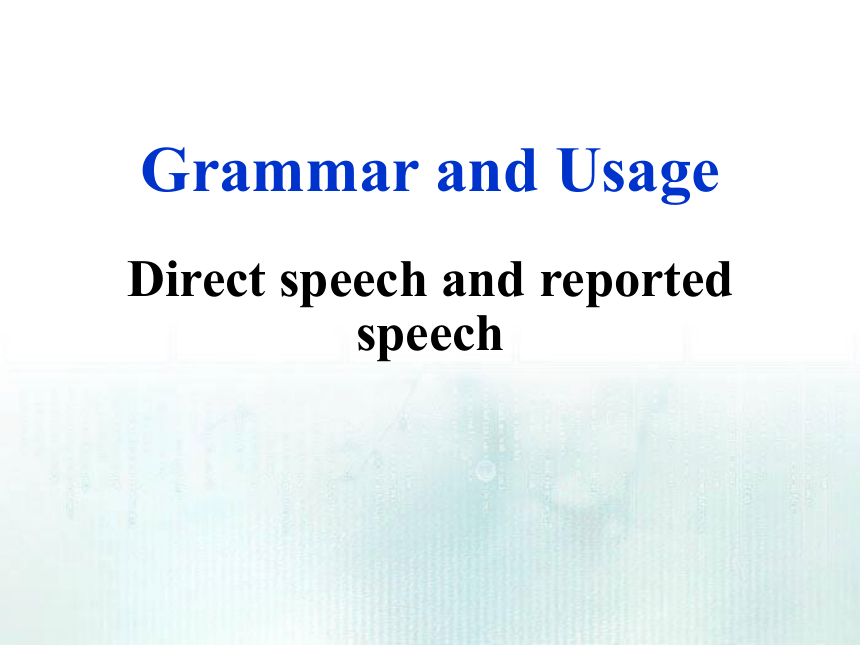
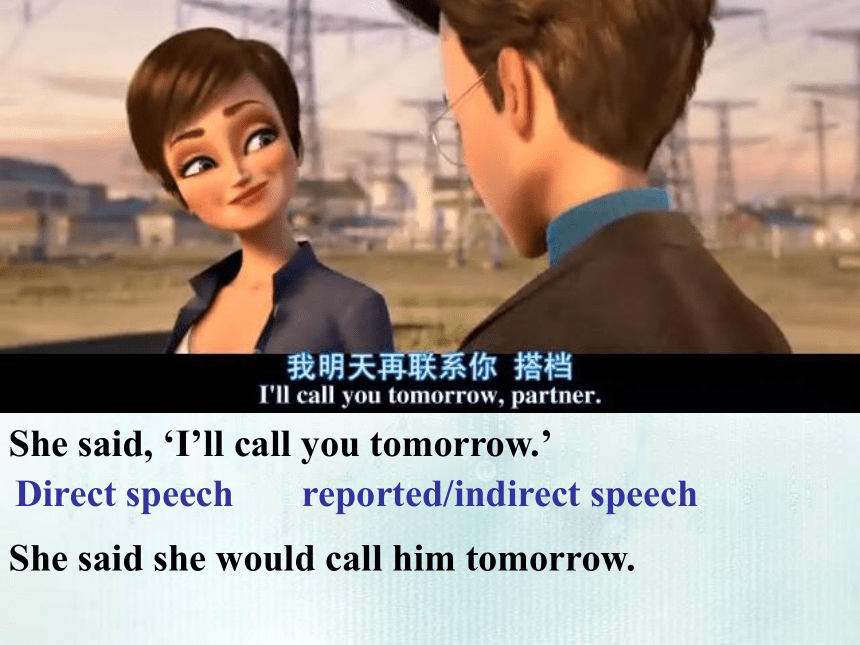
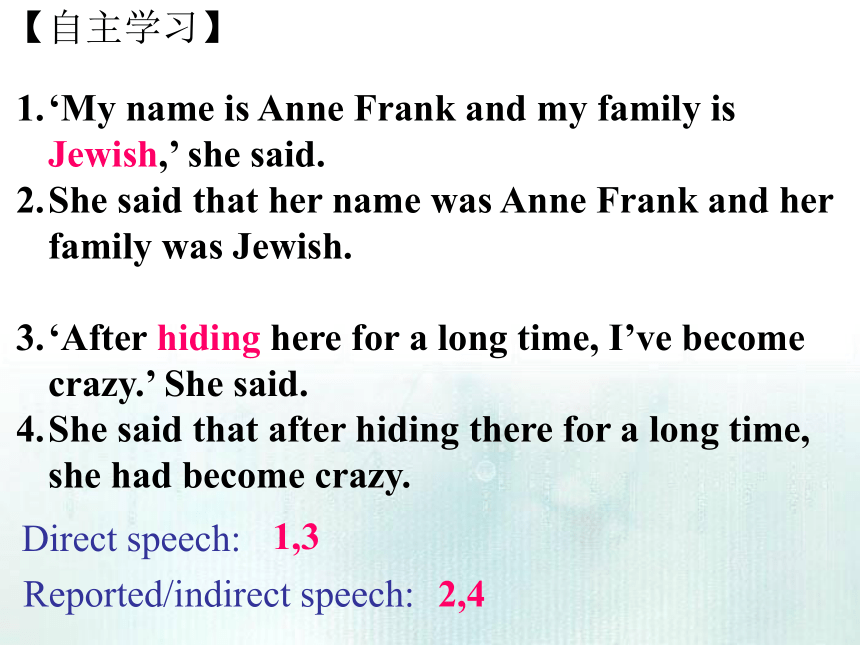
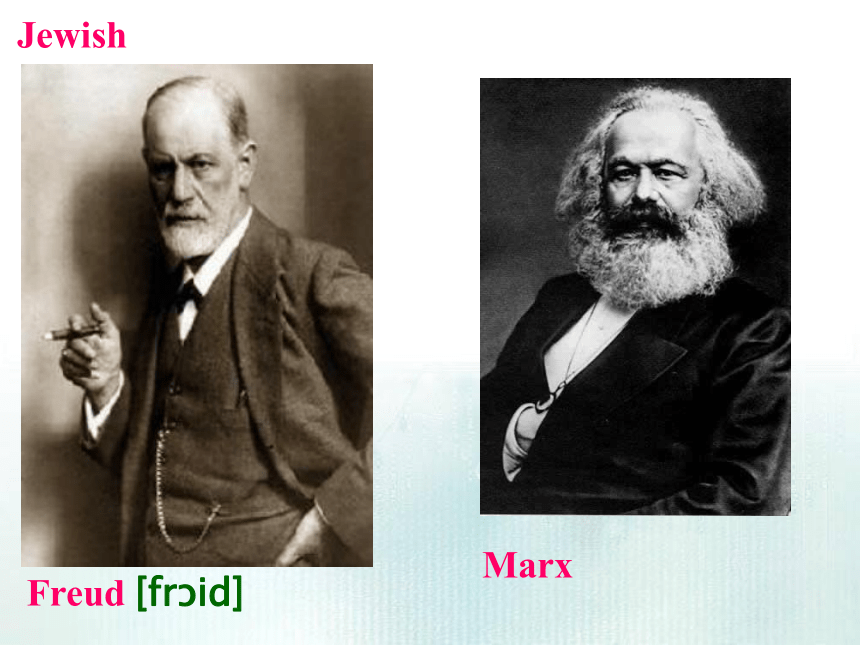
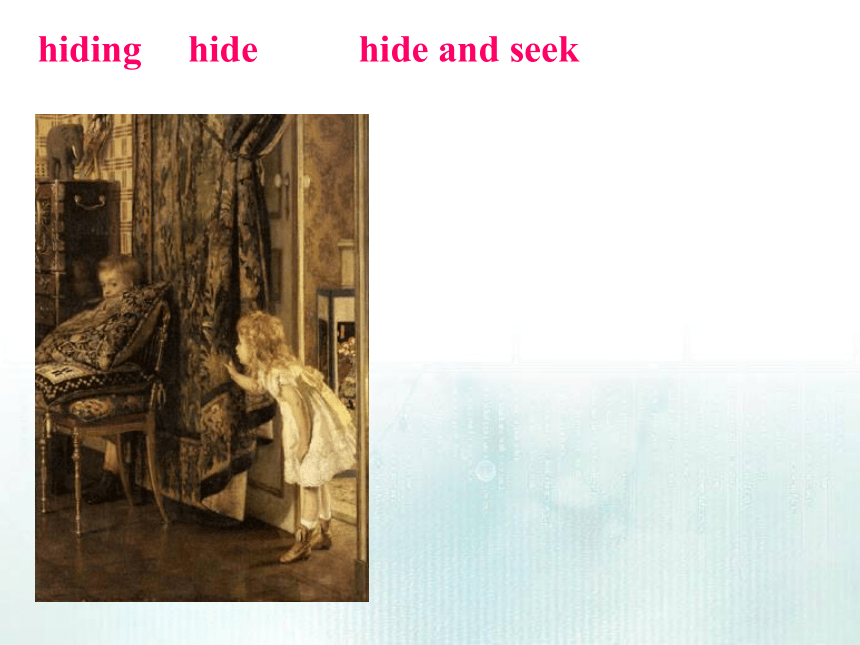
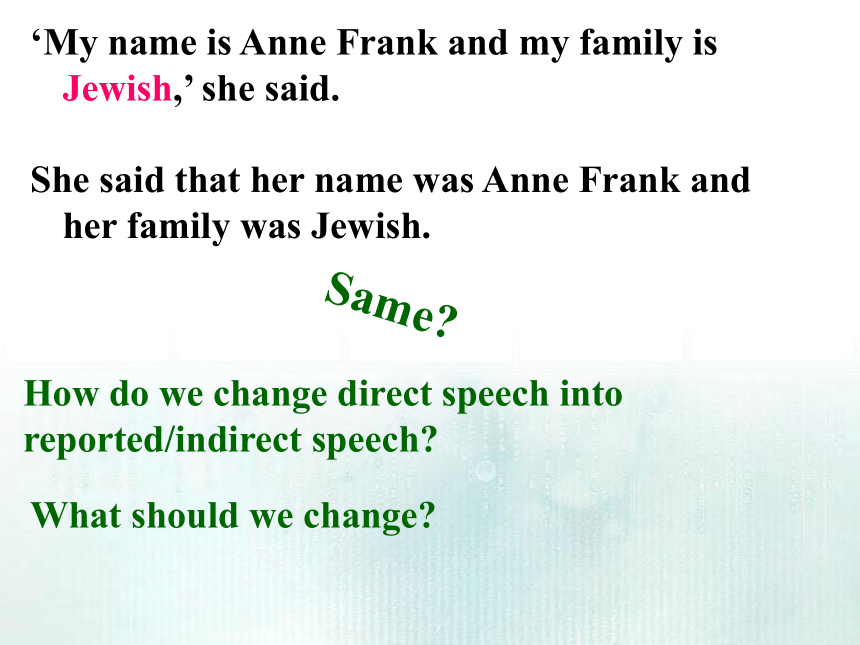
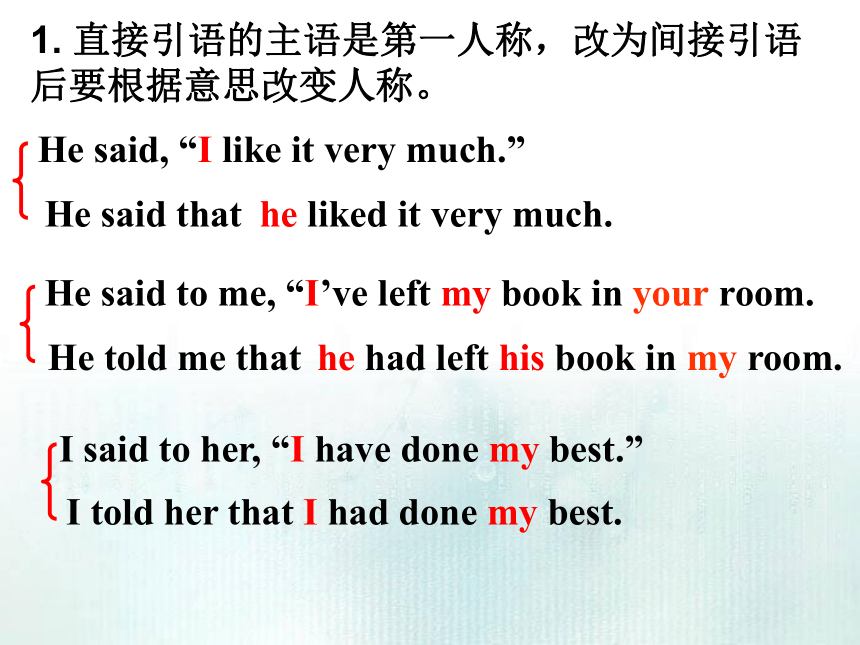
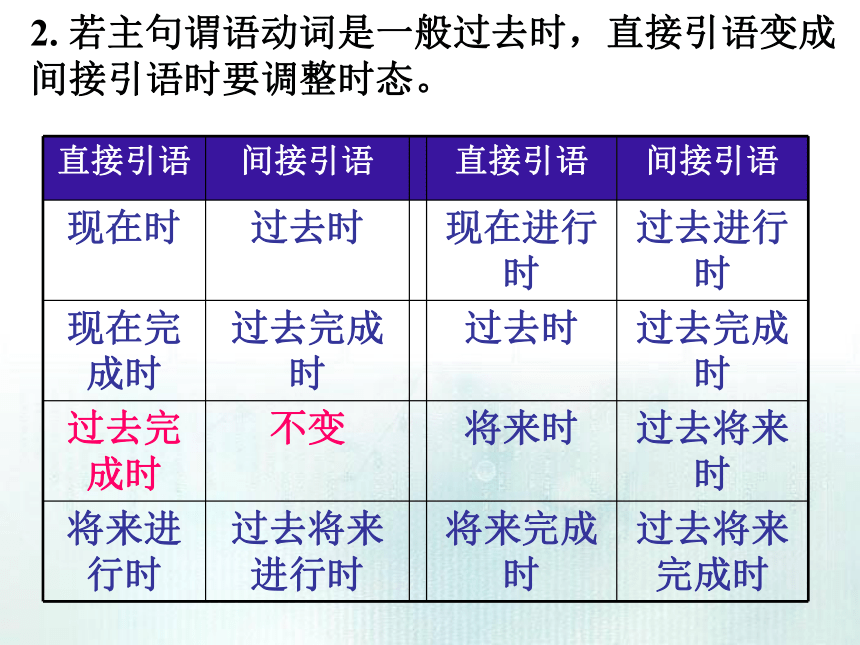

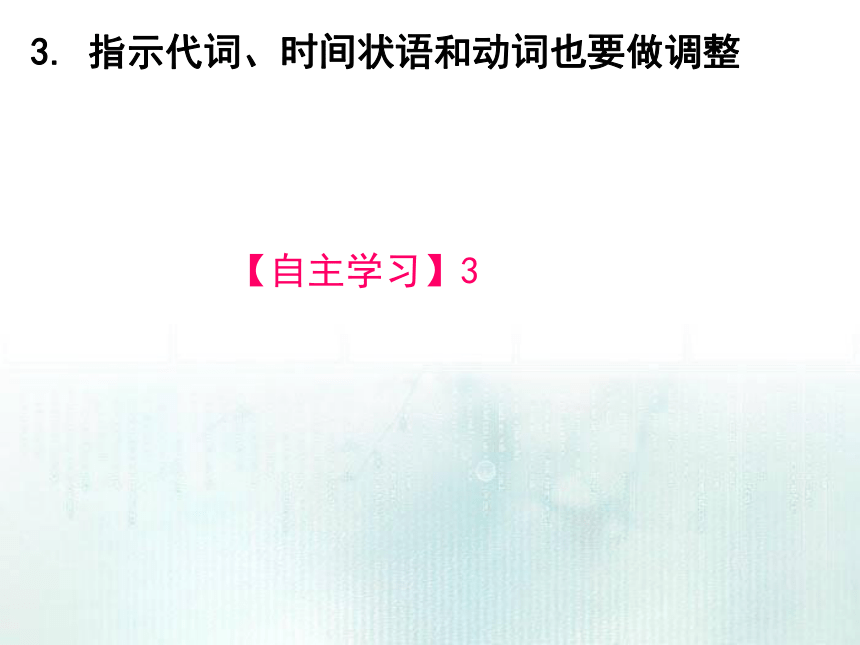
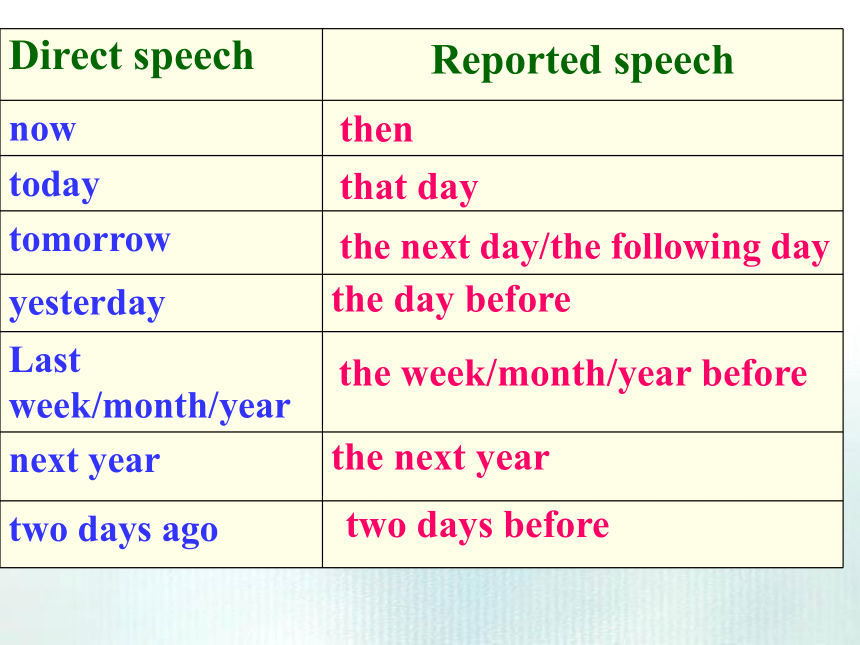
文档简介
(共36张PPT)
Grammar
and
Usage
Direct
speech
and
reported
speech
She
said,
‘I’ll
call
you
tomorrow.’
Direct
speech
reported/indirect
speech
She
said
she
would
call
him
tomorrow.
【自主学习】
‘My
name
is
Anne
Frank
and
my
family
is
Jewish,’
she
said.
She
said
that
her
name
was
Anne
Frank
and
her
family
was
Jewish.
‘After
hiding
here
for
a
long
time,
I’ve
become
crazy.’
She
said.
She
said
that
after
hiding
there
for
a
long
time,
she
had
become
crazy.
Direct
speech:
Reported/indirect
speech:
1,3
2,4
Jewish
Marx
Freud
[fr?id]
hiding
hide
hide
and
seek
‘My
name
is
Anne
Frank
and
my
family
is
Jewish,’
she
said.
She
said
that
her
name
was
Anne
Frank
and
her
family
was
Jewish.
Same?
How
do
we
change
direct
speech
into
reported/indirect
speech?
What
should
we
change?
1.
直接引语的主语是第一人称,改为间接引语后要根据意思改变人称。
He
said,
“I
like
it
very
much.”
He
said
that
He
said
to
me,
“I’ve
left
my
book
in
your
room.
He
told
me
that
I
said
to
her,
“I
have
done
my
best.”
I
told
her
that
I
had
done
my
best.
he
liked
it
very
much.
he
had
left
his
book
in
my
room.
2.
若主句谓语动词是一般过去时,直接引语变成间接引语时要调整时态。
直接引语
间接引语
直接引语
间接引语
现在时
过去时
现在进行时
过去进行时
现在完成时
过去完成时
过去时
过去完成时
过去完成时
不变
将来时
过去将来时
将来进行时
过去将来进行时
将来完成时
过去将来完成时
1.
‘I
haven’t
brought
my
dictionary,’
the
student
said.
2.
Tom
said
to
them,
‘I
will
get
excited.’
3.
My
father
said
to
me,
‘I
am
reading
the
book.’
The
student
said
that
he
hadn’t
brought
his
dictionary.
Tom
told
them
that
he
would
get
excited.
My
father
told
me
that
he
was
reading
the
book.
3.
指示代词、时间状语和动词也要做调整
【自主学习】3
Direct
speech
Reported
speech
now
today
tomorrow
yesterday
the
day
before
Last
week/month/year
next
year
the
next
year
two
days
ago
then
that
day
the
next
day/the
following
day
two
days
before
the
week/month/year
before
Direct
speech
Reported
speech
do/does
am/is/are
doing
has/have
done
did
had
done
不变
will
do
did
was
doing
had
done
had
done
would
do
Direct
speech
Reported
speech
may/can
must
Had
to
come
bring
might/could
go
take
Mr.?Smith?said?to?the?girl,?“I?will
come?here?to?see
?you?next?Sunday.”?
??
Mr.?Smith?_____?the?girl?that___?_____?__?___
to?see
____
___?________?Sunday.?
told
he
would
go
there
her
the
following
若直接引语为一般疑问句,改为间接引语时要用陈述句语序,而且要加连词____________。
if或whether
He
asked
me,
“Will
you
have
a
test
on
Thursday?”
He
asked
me
if
/
whether
I
would
have
a
test
on
Thursday.
若直接引语为特殊疑问句,间接引语就要使用特殊疑问词,而且要用陈述句语序。
“How
much
money
do
you
spend
on
books?”
he
asked
me.
He
asked
me
how
much
money
I
spent
on
books.
“What
is
your
uncle?”
he
asked
me.
He
asked
me
what
my
uncle
was.
Textbook
P11
Exercise
A
Sentence
4&5
He
asked
me
________
for
the
computer.
A.
did
I
pay
how
much
B.
I
paid
how
much
C.
how
much
did
I
pay
D.
how
much
I
paid
宾语从句要用陈述句语序。
D
She
asked
me
______
to
build
the
church.
how
long
it
was
taken
how
long
it
had
taken
how
much
time
did
it
take
how
much
time
it
was
taken
B
Someone
is
ringing
the
doorbell.
Go
and
see
_____
who
is
he
who
he
is
who
is
it
who
it
is
D
Mother
asked
me
_____
when
I
didn’t
feel
well.
what
is
the
matter
with
me
What
was
the
matter
with
me
what
matter
is
with
me
what
was
the
matter
with
me
D
当直接引语为祈使句时,间接引语要改为tell
(ask,
order,
advise,
warn)
sb.
(not)
to
do
sth.
等的句型。
My
mother
said
to
me,
“study
hard.”
My
mother
asked
me
to
study
hard.
My
father
said
to
us,
‘Don’t
throw
the
waste
paper
everywhere.’
My
father
warned
us
not
to
throw
the
waste
paper
everywhere.
→He
______
me
_____
the
window.
A.
said
to;
to
close
B.
told
to;
closing
C.
asked
;
to
close
D.
said
to;
please
close
C
感叹句转化为间接引语可用
‘what’或
‘how’
引导,也可用that引导。
‘What
a
hot
day
it
is!’
they
all
complained.
They
all
complained/said
that
__________________.
They
all
complained/said
______________________.
They
all
complained/said
that
_______
a
hot
day.
what
a
hot
day
it
is
how
hot
a
day
it
is
it
was
由直接引语转变为间接引语,下列情况时态不变:
1.
不变的真理或格言
The
teacher
said
to
the
students,
“Water
freezes
when
the
temperature
falls
below
0℃.”
→
The
teacher
told
the
students
that
water
freezes
when
the
temperature
falls
below
0℃.
2.
经常的习惯:
He
said
to
the
doctor,
“I
smoke
two
packs
every
day.”
→
He
told
the
doctor
that
he
smokes
two
packs
every
day.
3.
与具体的过去时间连用:
The
teacher
said,
“World
War
II
ended
in
1945.”
→
The
teacher
said
that
World
War
II
ended
in
1945.
4.
没有时态变化的情态动词,如must,
ought
to,
used
to,
had
better等:
She
said
to
me:
“You
must
hurry
up.”
→
She
said
that
I
must
hurry
up.
注意:表示“建议”“命令”“要求”的词,宾语从句中使用虚拟语气
“should
+
do”。
The
man
insisted
that
he
_____
the
law
and
___
free.
didn’t
break;
set
didn’t
break;
was
not
shouldn’t
break;
should
be
set
hadn’t
broken;
be
set
Her
pale
face
_____
she
was
ill,
so
the
doctor
suggested
that
she
______.
suggests;
has
a
rest
suggested;
had
a
rest
suggested;
have
a
rest
suggests;
have
a
rest
We
demanded
that
he
____
bill
by
the
end
of
this
month.
must
pay
pay
paid
had
paid
He
said
that
practice
____
perfect.
A.
makes
B.
made
C.
make
D.
making
Grammar
and
Usage
Direct
speech
and
reported
speech
She
said,
‘I’ll
call
you
tomorrow.’
Direct
speech
reported/indirect
speech
She
said
she
would
call
him
tomorrow.
【自主学习】
‘My
name
is
Anne
Frank
and
my
family
is
Jewish,’
she
said.
She
said
that
her
name
was
Anne
Frank
and
her
family
was
Jewish.
‘After
hiding
here
for
a
long
time,
I’ve
become
crazy.’
She
said.
She
said
that
after
hiding
there
for
a
long
time,
she
had
become
crazy.
Direct
speech:
Reported/indirect
speech:
1,3
2,4
Jewish
Marx
Freud
[fr?id]
hiding
hide
hide
and
seek
‘My
name
is
Anne
Frank
and
my
family
is
Jewish,’
she
said.
She
said
that
her
name
was
Anne
Frank
and
her
family
was
Jewish.
Same?
How
do
we
change
direct
speech
into
reported/indirect
speech?
What
should
we
change?
1.
直接引语的主语是第一人称,改为间接引语后要根据意思改变人称。
He
said,
“I
like
it
very
much.”
He
said
that
He
said
to
me,
“I’ve
left
my
book
in
your
room.
He
told
me
that
I
said
to
her,
“I
have
done
my
best.”
I
told
her
that
I
had
done
my
best.
he
liked
it
very
much.
he
had
left
his
book
in
my
room.
2.
若主句谓语动词是一般过去时,直接引语变成间接引语时要调整时态。
直接引语
间接引语
直接引语
间接引语
现在时
过去时
现在进行时
过去进行时
现在完成时
过去完成时
过去时
过去完成时
过去完成时
不变
将来时
过去将来时
将来进行时
过去将来进行时
将来完成时
过去将来完成时
1.
‘I
haven’t
brought
my
dictionary,’
the
student
said.
2.
Tom
said
to
them,
‘I
will
get
excited.’
3.
My
father
said
to
me,
‘I
am
reading
the
book.’
The
student
said
that
he
hadn’t
brought
his
dictionary.
Tom
told
them
that
he
would
get
excited.
My
father
told
me
that
he
was
reading
the
book.
3.
指示代词、时间状语和动词也要做调整
【自主学习】3
Direct
speech
Reported
speech
now
today
tomorrow
yesterday
the
day
before
Last
week/month/year
next
year
the
next
year
two
days
ago
then
that
day
the
next
day/the
following
day
two
days
before
the
week/month/year
before
Direct
speech
Reported
speech
do/does
am/is/are
doing
has/have
done
did
had
done
不变
will
do
did
was
doing
had
done
had
done
would
do
Direct
speech
Reported
speech
may/can
must
Had
to
come
bring
might/could
go
take
Mr.?Smith?said?to?the?girl,?“I?will
come?here?to?see
?you?next?Sunday.”?
??
Mr.?Smith?_____?the?girl?that___?_____?__?___
to?see
____
___?________?Sunday.?
told
he
would
go
there
her
the
following
若直接引语为一般疑问句,改为间接引语时要用陈述句语序,而且要加连词____________。
if或whether
He
asked
me,
“Will
you
have
a
test
on
Thursday?”
He
asked
me
if
/
whether
I
would
have
a
test
on
Thursday.
若直接引语为特殊疑问句,间接引语就要使用特殊疑问词,而且要用陈述句语序。
“How
much
money
do
you
spend
on
books?”
he
asked
me.
He
asked
me
how
much
money
I
spent
on
books.
“What
is
your
uncle?”
he
asked
me.
He
asked
me
what
my
uncle
was.
Textbook
P11
Exercise
A
Sentence
4&5
He
asked
me
________
for
the
computer.
A.
did
I
pay
how
much
B.
I
paid
how
much
C.
how
much
did
I
pay
D.
how
much
I
paid
宾语从句要用陈述句语序。
D
She
asked
me
______
to
build
the
church.
how
long
it
was
taken
how
long
it
had
taken
how
much
time
did
it
take
how
much
time
it
was
taken
B
Someone
is
ringing
the
doorbell.
Go
and
see
_____
who
is
he
who
he
is
who
is
it
who
it
is
D
Mother
asked
me
_____
when
I
didn’t
feel
well.
what
is
the
matter
with
me
What
was
the
matter
with
me
what
matter
is
with
me
what
was
the
matter
with
me
D
当直接引语为祈使句时,间接引语要改为tell
(ask,
order,
advise,
warn)
sb.
(not)
to
do
sth.
等的句型。
My
mother
said
to
me,
“study
hard.”
My
mother
asked
me
to
study
hard.
My
father
said
to
us,
‘Don’t
throw
the
waste
paper
everywhere.’
My
father
warned
us
not
to
throw
the
waste
paper
everywhere.
→He
______
me
_____
the
window.
A.
said
to;
to
close
B.
told
to;
closing
C.
asked
;
to
close
D.
said
to;
please
close
C
感叹句转化为间接引语可用
‘what’或
‘how’
引导,也可用that引导。
‘What
a
hot
day
it
is!’
they
all
complained.
They
all
complained/said
that
__________________.
They
all
complained/said
______________________.
They
all
complained/said
that
_______
a
hot
day.
what
a
hot
day
it
is
how
hot
a
day
it
is
it
was
由直接引语转变为间接引语,下列情况时态不变:
1.
不变的真理或格言
The
teacher
said
to
the
students,
“Water
freezes
when
the
temperature
falls
below
0℃.”
→
The
teacher
told
the
students
that
water
freezes
when
the
temperature
falls
below
0℃.
2.
经常的习惯:
He
said
to
the
doctor,
“I
smoke
two
packs
every
day.”
→
He
told
the
doctor
that
he
smokes
two
packs
every
day.
3.
与具体的过去时间连用:
The
teacher
said,
“World
War
II
ended
in
1945.”
→
The
teacher
said
that
World
War
II
ended
in
1945.
4.
没有时态变化的情态动词,如must,
ought
to,
used
to,
had
better等:
She
said
to
me:
“You
must
hurry
up.”
→
She
said
that
I
must
hurry
up.
注意:表示“建议”“命令”“要求”的词,宾语从句中使用虚拟语气
“should
+
do”。
The
man
insisted
that
he
_____
the
law
and
___
free.
didn’t
break;
set
didn’t
break;
was
not
shouldn’t
break;
should
be
set
hadn’t
broken;
be
set
Her
pale
face
_____
she
was
ill,
so
the
doctor
suggested
that
she
______.
suggests;
has
a
rest
suggested;
had
a
rest
suggested;
have
a
rest
suggests;
have
a
rest
We
demanded
that
he
____
bill
by
the
end
of
this
month.
must
pay
pay
paid
had
paid
He
said
that
practice
____
perfect.
A.
makes
B.
made
C.
make
D.
making
